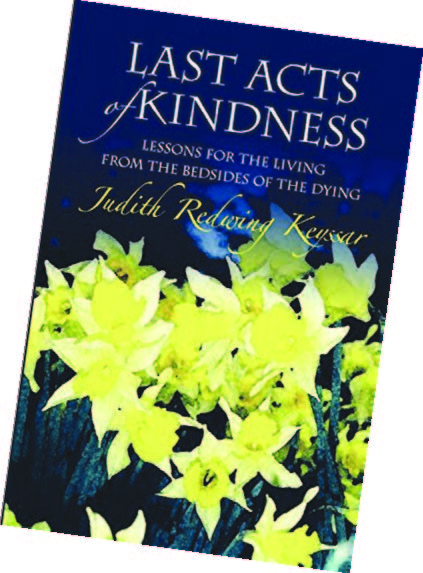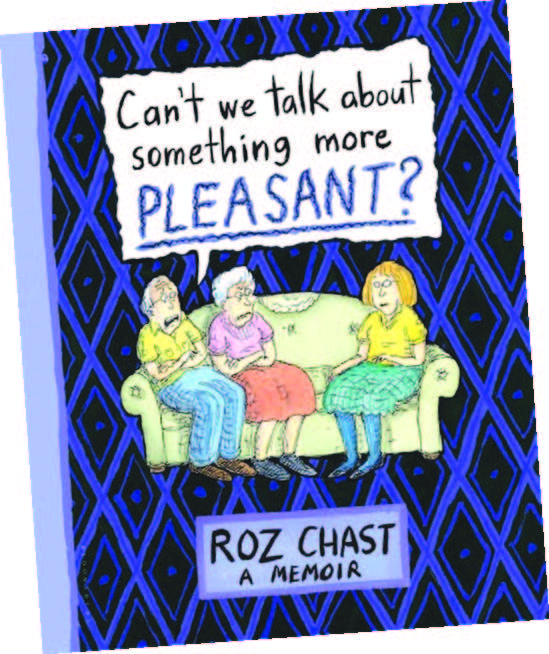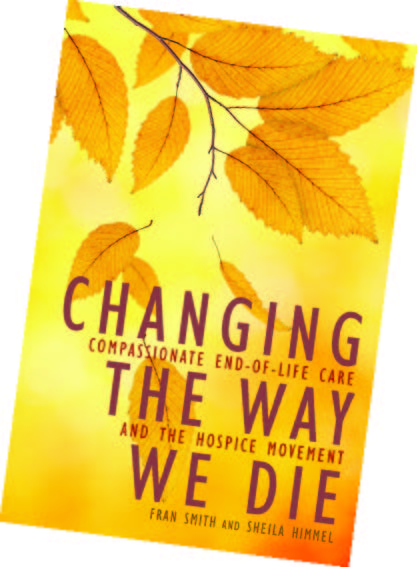Talking About Death Won’t Kill You
 Death is in the Zeitgeist. Everyone is talking about death, or not talking about it, as the case may be. Or, to be yet more precise: many are talking about the social norm of not talking about death.
Death is in the Zeitgeist. Everyone is talking about death, or not talking about it, as the case may be. Or, to be yet more precise: many are talking about the social norm of not talking about death.
By embracing our mortality, we can live our lives to their very fullest. A plethora of books investigate the subject from a variety of perspectives. Atul Gawande’s powerful Being Mortal: Medicine and What Matters in the End offers a physician’s perspective, while Roz Chast’s hilariously heartbreaking graphic novel Can’t We Talk About Something More Pleasant? idiosyncratically documents her rollercoaster experience with her aging parents.
Misconceptions about what hospice is, and isn’t, are put to rest by Sheila Himmel and Fran Smith in Changing the Way We Die: Compassionate End-of-Life Care and the Hospice Movement. Increasingly popular are living funerals, like the one held by Morrie Schwartz, made famous by Mitch Albom in the bestselling book and film adaptation Tuesdays with Morrie. Locally, palliative care expert Judith Redwing Keyssar speaks regularly about the challenges and rewards that face the dying, their loved ones, and the professionals who care for them. Her book Last Acts of Kindness: Lessons for the Living from the Bedsides of the Dying encourages us to consider our own beliefs about the great questions of life and death.
Many organizations are developing public programming as evidenced by the “Embracing the Journey, an End of Life Resource Fair” at JCCSF last fall and being repeated in Fall 2016. The SFBA Network for End-of-Life Care hosts monthly meetings (sfeol.org) as does the Bay Area Funeral Consumers Association.
An ongoing series at the San Francisco Public Library entitled “We’re All Terminal: Living with Death and Dying” has included panels, book discussions, and documentary films
(www.sfpl.org). Through August there will be workshops on writing one’s own obituary, advance directives, and Larry Martel reading from his memoir Embracing Cancer, Embracing Life: The Guide for the Journey Beyond Diagnosis. Also at branches throughout the SFPL system, Stuart Bronstein offers writing workshops, from which a prepared participant can exit the free, 90-minute session with a legally binding will. Important local organizations include the Seven Ponds and Final Passages.
Following 25 years of efforts, the California End of Life Option Act, closely following Oregon’s Death with Dignity Act, is newly in effect. The film “How to Die in Oregon” powerfully documents how our neighbors to the north approach the controversial issue of “authorizing an adult who meets certain qualifications, and who has been determined by his or her attending physician to be suffering from a terminal disease, as defined, to make a request for a drug prescribed pursuant to these provisions for the purpose of ending his or her life.”
Of course the LGBTQIA community has been dealing with death for decades. Our communities are particularly subject to anti-queer violence and AIDS, in addition to cancers and the many other causes of death felling society at large. That doesn’t mean we’re necessarily more adept at discussing these complex personal issues. Many of us may not be out in all arenas of lives, including our family or friends, our religious leaders, care givers, or other social agencies. Fear of discrimination, past negative experiences, and perceived lack of legal resources contribute to this situation that can create unforeseen complications when the Grim Reaper makes his inevitable appearance.
One safe place to discuss the taboo topic of death is a Death Café, an informal gathering with no agenda, objectives or themes. As a discussion group rather than a grief support or counselling session, Death Cafés are intended (as its website, DeathCafé.com proclaims) “to increase awareness of death with a view to helping people make the most of their (finite) lives.”
In fact, surprisingly, it can be fun. Death Cafés, at least the ones held monthly at the Potrero Branch Library, are often filled with laughter. Light refreshments, including tea and home-baked cookies, are available to emphasize the corporeality of the participants. Some people attend monthly, others come once or twice, then move on. Their stories are always inspiring and energizing, not macabre or depressing, as some stereotypes might suggest. And the demographics defy expectations as well, with ages ranging from the twenty-somethings to octogenarians. Largely, though, it is Baby Boomers dealing with end of life issues for their parents, who are also facing their own mortality.
The first Death Café was held by Swiss sociologist and anthropologist Bernard Crettaz in Neuchatel, Switzerland, in 2004, followed by a Paris event in 2010. In September 2011 Jon Underwood and Sue Barsky Reid held a Death Café in London. The social franchise quickly spread across Europe, North America and Australasia and thousands of gatherings have occurred.
Among the possible wide-ranging topics are religious or cultural customs, existential fears, burial options, cremation dispersal, home funerals, advanced care directives and living wills. Stories are shared about deathbed experiences and communications with “the other side”. There are so many resources mentioned during the two-hour discussion that the group has created its own Pinterest page.
To find a convenient Death Café, visit DeathCafé.com
Entering a zip code leads you to the closest meeting, either temporally or geographically. Death Cafés are always offered on a not for profit basis, in an accessible, respectful and confidential space, and with no intention of leading people to any conclusion, product or course of action. If you don’t find a convenient Café, consider starting your own. It’s easy to follow the guidelines on the website.
Talking about Death, contrary to popular belief, won’t kill you!
Jim Van Buskirk is a librarian, author, public speaker, group facilitator and collections manager. He co-facilitates monthly Death Cafés and helps develop the San Francisco Public Library’s “We’re All Terminal: Living with Death and Dying.”














Recent Comments